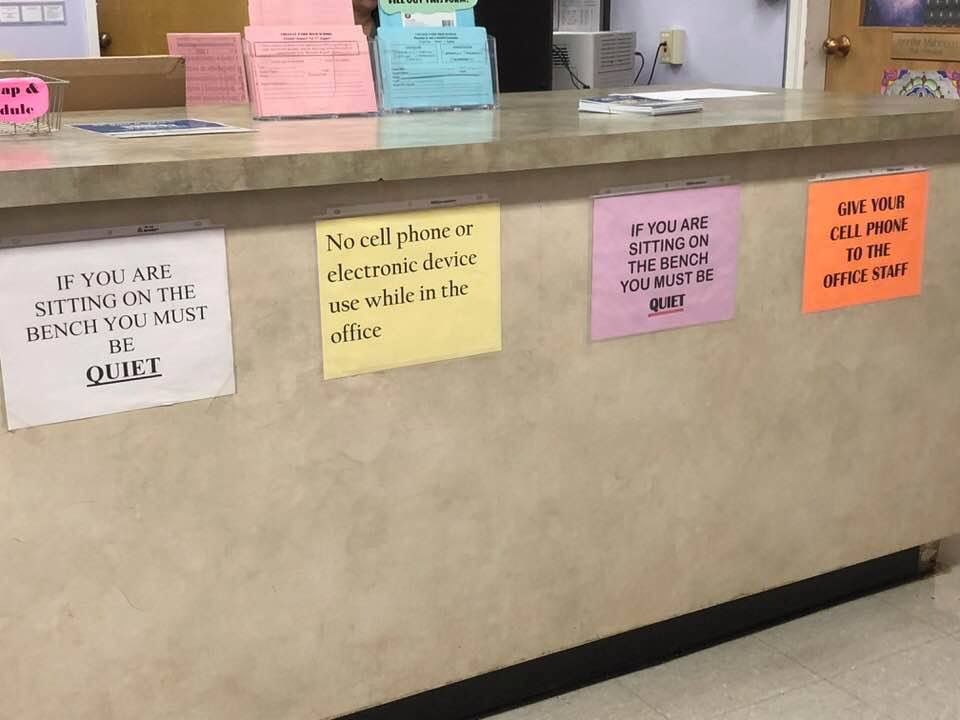Front Office at a Jr. High School
No hoods may be worn in hallways at school.
Students must follow the dress code.
Students must line up single file when the bell rings.
No talking in the library.
No chewing gum at school.
Students must line up in a boy line and girl line for lunch.
Students who are late will go to after school detention.
Students may not get off the buses until 8:25 am (even if they arrive at 8:15 or earlier).
Students must wear the uniform with the school logo (even though it is more expensive and our students can’t afford them.)
Students will be given nightly homework by each teacher.
Students must ask permission to go to the bathroom.
Students must sit quietly in the mornings before school starts.
Students must sit in rows by class as they enter the cafeteria, no moving seats
These are just a sampling of the hundreds of rules educational leaders were questioning a few weeks back at a Design Thinking Session I co-led with Kami Thordarson at the ASCD Conference on Educational Leadership. As a long time educator, I’ve always struggled with how rule-based education is but have been hopeful that we’ve moved beyond the experiences I heard and honestly felt shocked by the rules still in place at many schools. No wonder students struggle to be engaged. I don’t know about you as a learner but I immediately tune out teachers, presenters or leaders who start with a list of rules for me to follow. Why should we expect anything different from our students?
“Know the rules well, so you can break them effectively.”
And these rules don’t yet touch on the unwritten “practices or traditions” that govern so much of what we do in schools. You know “the way we’ve always done it” kind of things. Below are just a sampling of these practices and traditions leaders were questioning during our time together.
Why is our school year 180 days?
Why are Parent-Teacher conferences scheduled during the workday?
Why does every teacher need their own classroom?
Why do we structure our schools around age-based student groups?
Why do we have letter grades?
Why are we (teachers) continually correcting student work?
Why do we insist that students with profound cognitive deficits be tested on grade level?
Why do we assign homework?
The world has changed drastically, and yet many of our educational institutions are embracing practices of the past that have become so much a part of us we no longer question why we do them. This is further exasperated by the fact that most of our teachers and parents are also a product of the educational system and as a result are accustomed to the routines, rules, and rituals of school. We are all fish swimming in the ocean, having a hard time describing what the water is like around us. And yet, in order to change practices, we must first become uncomfortable with the status quo. The good news is that anything that has been designed can be redesigned including all of our archaic rules & practices. If you too are questioning the rules at your school, here is a simple 3 step process you can use to challenge and change them.
Simple Change = Profound Impact What is the simplest thing you can do that will have the most profound impact and move you closer to your goal? Is there something small, a practice or rule, that is getting in your way? If so, investigate it using a simple one-two-three approach:
Identify (one simple rule or practice getting in your way),
Ask Why? (why does the rule or practice exist? Is the rule for students or was it created for the convenience of adults?)
Modify (how can you change the rule or practice to make a big impact)
What rules are you starting to question? Let’s stop tweaking our educational system around the edges and start intentionally breaking rules that will create space to re-imagine school based on the needs of our students. Intentional rule breaking can help us step into the universe of possibility.
I’d love to hear what rules and practices you are questioning. Better yet, I’d love to hear what rules you are breaking and changing! Share #DT4EduLeaders #RuleBreaker

